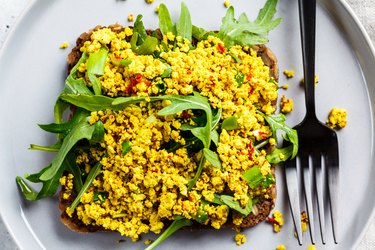
Like other legumes, soybeans and products derived from them (e.g., tofu and soy milk) may cause symptoms of irritable bowel syndrome (IBS). But if people with IBS ease into soy consumption gradually, the same components that initially provoke symptoms may be beneficial in the long run.
Read more: What Is IBS, Exactly?
Video of the Day
Video of the Day
The Lowdown on Soy
Soy is a terrific source of protein, containing all nine essential amino acids needed to make up a complete protein (unlike other relatively high-protein plant-based foods, which are incomplete proteins), notes the Harvard T.H. Chan School of Public Health. Soy products are also rich in B vitamins, fiber, potassium and magnesium, it adds.
Because it takes on the flavor of whatever is added to it, soy is often used as the basis for plant-based meat alternatives, which have proliferated in recent years. Historically though, soy has been considered a bit of a mixed bag, largely due to a misunderstanding of the phytoestrogens it contains.
"We've long vilified soy as a source of estrogen, which can be a concern because of that hormone's role in certain cancers," says Will Bulsiewicz, MD, MSCI, a gastroenterologist at Lowcountry Gastroenterology in Mount Pleasant, South Carolina. "But soy contains isoflavones. These are neither human nor animal estrogens, but phytoestrogens, which behave very differently."
Isoflavones either promote or weaken estrogen production in the human body, depending on the level of estrogen the person already has. While isoflavones may weaken estrogen in people going through pre-menopause (who have high levels of circulating estrogen), it may act like estrogen in people going through post-menopause, according to Harvard.
"Isoflavones behave very similarly to tamoxifen, which is a part of the treatment for hormonal breast cancers" Dr. Bulsiewicz explains. "Today, isoflavones are considered to be protective. Many major cancer centers advise people diagnosed with breast cancer to increase their soy intake because studies suggest it could prolong their life expectancy."
Soy and IBS
In the general population, soy products are usually well tolerated. But there are two groups of people who can have trouble with it — those who are allergic to it (soy is one of eight foods designated as major food allergens, according to the US Food and Drug Administration) and people with IBS.
"Soy contains galactans, prebiotics that help keep the gut microbiome healthy," says Dr. Bulsiewicz. "But these galactans, which are FODMAPs [fermentable oligosaccharides, disaccharides, monosaccharides and polyols], can be troublesome for people with IBS."
However, this doesn't mean that they should be avoided forever. While a low-FODMAP diet is a treatment strategy for IBS, the restrictive diet can be hard to stick with. Furthermore, ongoing restriction of prebiotic FODMAPs can be harmful to the gut microbiome.
For this reason, the initial, most restrictive phase of a low-FODMAP diet is only four to six weeks. After that, people with IBS may reintroduce high-FODMAP foods gradually, with a goal of maintaining symptom relief while consuming beneficial prebiotics, according to a March 2017 article in the Journal of Gastroenterology and Hepatology.
Therefore, you may have to avoid soy for short periods of time, or eat it only in small amounts each week, to keep it from triggering IBS symptoms.
Read more: Your Ultimate Guide to Living Well With IBS
Choose Wisely
People seeking soy-based foods have plenty to choose from these days, but many meat replacement products contain a plethora of ingredients that may not benefit your health, and could be detrimental. These highly processed soy products may not be the cornerstone of a healthy diet.
"If you look at the way soy is consumed in East Asia, they do it right — whole-bean soy foods like edamame, minimally processed whole-bean soy foods like soy milk or tofu, fermented soy like miso and tempeh and natto, which has a special enzyme, nattokinase, that protects against heart disease," says Dr. Bulsiewicz. (In fact, while large clinical trials are needed, an August 2019 analysis in Food Science & Nutrition cites multiple studies suggesting that nattokinase may reduce the buildup of plaque in the arteries.)
Dr. Bulsiewicz recommends consuming the above soy foods, preferably organic. Non-organic soy in the US is likely to be genetically modified to withstand exposure to the widely used herbicide glyphosate (Roundup). "I don't see anything redeeming about glyphosate, especially in the context of these highly processed soy protein isolates," Dr. Bulsiewicz says. "None of those are healthy."
- Will Bulsiewicz, MD, MSCI, gastroenterologist, Lowcountry Gastroenterology, Mount Pleasant, South Carolina, and author, Fiber Fueled
- Harvard T.H. Chan School of Public Health: “Straight Talk About Soy”
- Journal of Gastroenterology and Hepatology: “How to Institute the Low-FODMAP Diet”
- US Food and Drug Administration: "Food Allergies"
- Food Science & Nutrition: "Study on Molecular Mechanisms of Nattokinase in Pharmacological Action Based on Label‐Free Liquid Chromatography–Tandem Mass Spectrometry"
Is this an emergency? If you are experiencing serious medical symptoms, please see the National Library of Medicine’s list of signs you need emergency medical attention or call 911.